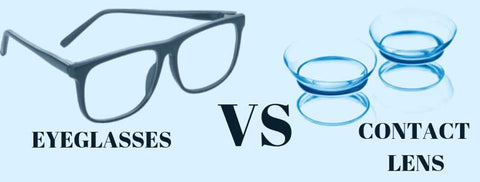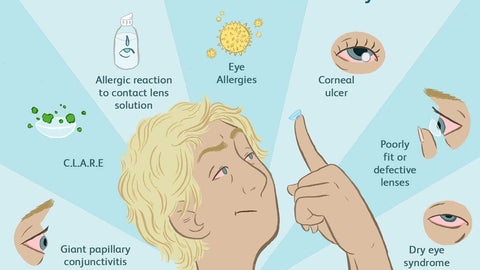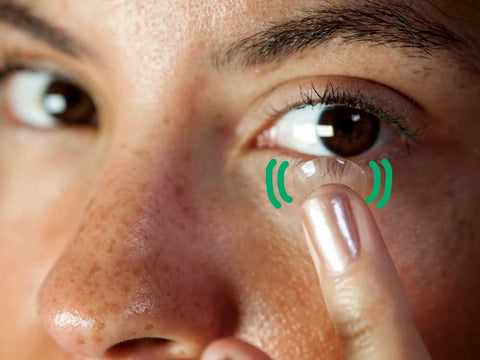What effect does the weather have on contact lenses?
Recently, everyone has been required to wear a mask while going out, which sometimes troubles people who wear glasses because the glasses frequently fog up and become obscure. When wearing a mask, there are gaps on both sides of the bridge of the nose, and the exhaled water vapor will be closer to the glasses. When the temperature is cooler and the relative humidity is high in the spring, the lenses are more likely to fog up when we exhale, since the air itself has a harder time holding additional moisture, causing the exhaled moisture to condense on the cooler lenses.

However, even in the hot summer, people who wear glasses will encounter the embarrassing experience of fogging: when they go outdoors after shopping in an air-conditioned shopping mall, even if they don't wear a mask, the glasses immediately start to fog before exhaling. This is because on hot days with high relative humidity, there is more moisture in the outdoor air, which can fog up upon contact with the cooled lenses. But as the lenses warmed up outdoors, the white fog faded away. The weather will affect glasses to cause fog, thus will contact lenses be affected by the weather? If so, how is it influenced?
Wearing contact lenses in the summer can produce three types of eye discomfort:
1. Sweat flows into your eyes
Summertime sweating is common, and the sweat contains a variety of microorganisms. When it enters the eyes, it not only causes discomfort but may also cause inflammation. It is more likely that rubbing your eyes with your hands will result in issues such as conjunctivitis.
2. Stay in air-conditioned rooms most of the time
To escape the heat in the summer, everyone prefers to stay in air-conditioned accommodation. You should avoid blowing cold air directly into your eyes at this time since it will speed up the loss of water in your eyes, making the lenses dry, and causing blurred vision and discomfort.
3. There is a lot of dust in the environment.
In summer, everyone opens their windows to ventilate and cool themselves with fans. As a result, dust is easily suspended in the air and can enter the eyes or attach to the conjunctiva or the lenses of contact lenses, causing eye irritation.

To avoid eye pain while wearing contact lenses in summer, you should be aware of these issues.
1. Do not swim or bathe when wearing contact lenses.
Neither the swimming pool nor the beach can ensure its hygiene conditions. Because contact lenses are absorbent and harmful bacteria in the water are quickly deposited on them, wearing contact lenses while swimming is not recommended.

2. Wear rimmed glasses to work if possible.
In the office, not only will the chilly air from the air conditioner irritate the eyes, but wearing contact lenses and staring at the computer for extended periods of time will diminish the number of blinks per minute. Furthermore, improper cleanliness habits when wearing contact lenses will cause not only eye irritation but also keratitis and other complications.

3. Pay close attention to cleaning and hygiene concerns.
Because the temperature is hot and the germs are active, growing and multiplying quickly, the cleaning solution and disinfectant should be refreshed daily to ensure safe and reliable use.
4. Supplemental eye nourishment
Eye discomfort caused by vitamin deficiency can be alleviated by feeding the eyes with nutrients. For example, vitamin A supplementation can relieve and prevent dry eye syndrome. Suppling lutein can prevent blue light from entering the eyes and relieve eye discomfort caused by prolonged use of mobile phones or computers. Anthocyanin supplementation can remove harmful free radicals and protect the eyes from discomfort.

Here are a few things to keep in mind when wearing contact lenses in winter:
1. Do not wear contact lenses in windy conditions throughout the winter.
Winter is already dry, and strong gusts can blast a lot of dust into your eyes. If not cleaned promptly, it can cause corneal damage or possibly blindness. Dry eye conditions can be caused by a lack of supplements. When going out in windy weather, it is best to wear glasses. It is also advisable to keep a humidifier in the room when wearing contact lenses indoors.
2. Avoid wearing contact lenses while sick
It is easy to catch a cold in winter and when you have a cold, your body is weak and vulnerable to infection; if a cold sufferer does not wipe the bacteria on their hands before removing their glasses, it is simple for the bacteria to enter the eyes and create inflammation. In addition, several anti-cold medications will be taken during the cold season. These medications will impede the components in the eyes, which may lead to the lack of timely replenishment of the water in the contact lenses and affect the wearing comfort.
3. Use eye drops if you wear contact lenses in the winter.
The weather is dry in winter, and it is possible to dry eyes due to insufficient water supply of contact lenses, thus it is preferable to use eye drops every 2 hours while wearing contact lenses, no more than 6 times each day.
4. Avoid wearing contact lenses in winter haze.
There is a high incidence of smog in winter, and wearing contact lenses to go out during smog days is not recommended. On hazy days, microscopic particles in the air will stick to the lenses of contact lenses. Wearing such contact lenses will irritate our eyes and cause eye damage. At the same time, the pressure is extremely low in haze weather. Wearing contact lenses at this time will result in hypoxia of the cornea, and wearing them for an extended period will result in corneal injury.

Questions:
1. If I order colored contact lenses online, will it affect by the weather?
You purchased contact lenses online. They are delivered to your home later. Don't be concerned about contacts left at your door.
The box of contacts has been sitting at your front door for much of the day while you've been at work, exposing it to the weather.
2. Should you be concerned about the contacts' condition?
No. According to research, contact lenses can resist both extreme heat and antarctic-like cold.


Leave a comment